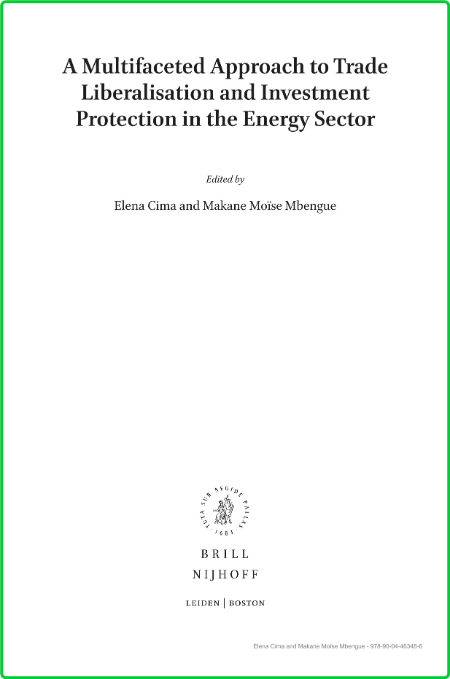
A Multifaceted Approach to Trade Liberalisation and Investment Protection in the Energy Sector
pdf | 2.47 MB | English | Isbn: B07VPKNYQT | Author: Elena Cima and Makane Moïse Mbengue | Year: 2019
Description:
China's accession to the World Trade Organization (WTO) in December 2001 created substantial opportunities for U.S. companies seeking to expand into China's market. In joining the WTO, China agreed to liberalize its trade regime and open its markets to foreign goods and services. However, the U.S. government has become concerned about ensuring that China honors its commitments to offer a more predictable environment for trade. GAO was asked to describe (1) the monitoring of compliance challenges associated with the scope and complexity of China's WTO commitments and (2) the efforts to date of the key players involved in ensuring China's compliance: the executive branch, Congress, the private sector, the WTO and its other members. GAO's observations are based on its prior analysis of China's WTO commitments, its previous survey of and interviews with private sector representatives, and its examination of first-year efforts to ensure China's WTO compliance.
The scope and complexity of China's WTO commitments present two main challenges to verifying China's compliance with its WTO accession agreement. First, the agreement is very broad: It encompasses more than 800 pages, spans eight broad areas, and sets forth hundreds of individual commitments on how China's trade regime will adhere to the WTO's agreements, principles, and rules and allow greater market access. Second, the agreement is complicated: Interrelated parts will be phased in at different times, and some commitments are so general in nature that it may not be immediately clear whether China has fully complied with its obligations. Each of the key players involved in ensuring China's compliance--the executive branch, Congress, the private sector, and the WTO and its members--has made efforts to ensure China's compliance. However, the first-year experience in this regard has demonstrated that these efforts will need to be sustained over a long period. The executive branch has applied additional resources and new intra-agency teams to these efforts, but it takes time to organize these activities. Congress has enacted legislation and established new entities to increase oversight of China's compliance. The private sector also has provided information to the executive branch and to Congress on the status of China's compliance efforts. And, within the WTO, a China-specific mechanism was established as a means for WTO members to annually review China's implementation of its commitments. Nonetheless, GAO's analysis indicates that a sustained approach is needed to ensure China's compliance.
The scope and complexity of China's WTO commitments present two main challenges to verifying China's compliance with its WTO accession agreement. First, the agreement is very broad: It encompasses more than 800 pages, spans eight broad areas, and sets forth hundreds of individual commitments on how China's trade regime will adhere to the WTO's agreements, principles, and rules and allow greater market access. Second, the agreement is complicated: Interrelated parts will be phased in at different times, and some commitments are so general in nature that it may not be immediately clear whether China has fully complied with its obligations. Each of the key players involved in ensuring China's compliance--the executive branch, Congress, the private sector, and the WTO and its members--has made efforts to ensure China's compliance. However, the first-year experience in this regard has demonstrated that these efforts will need to be sustained over a long period. The executive branch has applied additional resources and new intra-agency teams to these efforts, but it takes time to organize these activities. Congress has enacted legislation and established new entities to increase oversight of China's compliance. The private sector also has provided information to the executive branch and to Congress on the status of China's compliance efforts. And, within the WTO, a China-specific mechanism was established as a means for WTO members to annually review China's implementation of its commitments. Nonetheless, GAO's analysis indicates that a sustained approach is needed to ensure China's compliance.
Category:30-Minute Politics & Social Sciences Short Reads, Political Science, Politics & Government










